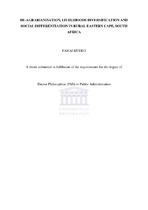De-agrarianisation, livelihoods diversification and social differentiation in rural Eastern Cape, South Africa
Abstract
This case study of three rural villages in Matatiele district in the Eastern Cape, South Africa examines the extent to which the diversification of rural livelihoods and processes of social differentiation are interconnected. The study combines intensive and extensive research methods to explore livelihoods diversification and social differentiation in the villages of Litichareng, Mutsini and Thaba Chicha. The intensive research consisted of 36 life history interviews, a wealth ranking exercise and a focus group discussion. The extensive research consisted of a survey of 124 households. The study makes use of political economy concepts of class, power and inequality and argues that these concepts enhance the heuristic value of livelihoods approaches which have often been critiqued for under-theorising power and politics. In the contemporary capitalist world, particularly in the global ‘South’, livelihoods have increasingly become diversified as rural households combine agricultural and non-agricultural sources of income for both survival and accumulation purposes, often straddling the rural-urban divide. In the ‘
de-agrarianisation’ thesis, livelihood diversification has been interpreted as entailing a shift from agrarian livelihood systems to non-agrarian modes of existence in the context of increased urbanisation and industrialisation. These kinds of large-scale processes have been unfolding in rural Matatiele, but this study argues that rural households combine both agricultural and non-agricultural sources of income and emphasises the continued importance of agricultural sources of income in rural livelihood systems. De-agrarianisation is cyclical and not unilinear, as some components of farming have remained important and resilient (homestead garden cultivation and livestock production) while other have declined (dry-land cropping in large arable fields).These shifts in agriculture occur against the background of state-sponsored, large-scale agricultural development schemes introduced to commercialise agriculture and reverse de-agrarianisation and fragmentation of rural livelihoods, but which have largely failed to do so. The challenge for scholars is how to characterise rural households, small-scale farmers, or ‘peasants’ in the light of highly diversified livelihood systems and their straddling of the rural and urban divide. This study uses a political economy approach and defines rural households that engage in small-scale agriculture as petty commodity producers in capitalism, combining class places of capital and labour and subject to social differentiation. The study argues that the highly diversified livelihood systems characteristic of rural households reflect a ‘crisis of social reproduction’ as rural households struggle to survive and accumulate. In this study it is argued that rural households are part of growing ‘classes of labour’ within contemporary capitalism.

